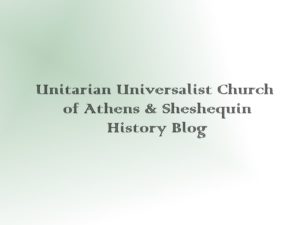Julia Kinney Scott, an early member of the Sheshequin Universalist Society, was well-known in Universalist circles as a poet. Her poems first appeared in Universalist newspapers in 1831. At least 100 of her poems and prose writings had been published in these papers by the time of her death in 1842.
Near the end of her life, Julia Scott asked her friend Sarah Edgarton to prepare a collection of her poems and a brief memoir of her life for publication. The proceeds, after all expenses had been paid, were to be put into a fund for the education of her son George, who was three years old when she died. Miss Edgarton agreed, and the book, “Poems, by Mrs. Julia H. Scott, and a Portrait, with a Memoir,” was published in 1843.
The book – at least the selection of poems – was favorably reviewed in the Universalist Union by Caroline Sawyer, a close friend of Julia’s. But Caroline’s husband, the Rev. Thomas Sawyer, wrote the following in the same newspaper:
“In reading the Memoir and Poems of Mrs. Scott, I am grieved to see the fact of her being a Universalist so lightly touched upon, or rather so purposely kept out of sight. The simple circumstance of her attending the General Convention of Universalists in Boston, is almost the only one that could be construed by one unacquainted with her life, to favor the relation she sustained to us, and this could hardly identify her with either our faith or denomination… I will not attempt to conceal my indignation at this treatment of Mrs. Scott’s memory. It is unparalleled, I believe, in our religious or literary history.”
The hot-headed Joseph Kingsbury, who was Julia’s uncle, jumped into the fray. He wrote:
“But what is there in this volume which will convey to those who come upon the stage of action after us, a proper knowledge of Mrs. Scott’s true character, and the position which she sustained, while a dweller upon earth? Surely, it is not such a work as the denomination had a right to expect. We had a right to expect a work that would not only have done justice to her talents as a writer, and to her character as a woman, as a friend, as a christian; but also a work which should have done justice to her character as a sincere and devoted Universalist. But have we such a work before us? Not so; but one which we should suppose from its perusal, was especially prepared for those who have but little love or respect for Universalism – a work which is almost wholly silent respecting that religious faith with which her heart was imbued, and one which falls far short of giving the reader an adequate comprehension of her true character. And is this just? Is it right? Is it proper? And more than all, is it showing a proper respect for the memory of the loved one, who has bid adieu to the scenes of earth?”
Kingsbury went on to accuse the publisher, Abel Tompkins of Boston, of omitting references to Universalism in order to increase sales and, consequently, his own profits. Regarding the alleged necessity of raising money for young George Scott’s education, Kingsbury scoffed:
“Dr. Scott [Julia’s husband, a physician] is amply able to educate his child, but was willing to acquiesce in the wishes of his late beloved wife… that her labors should afford a share of the expense in attaining the object she had so much in her mind, before her death.”
Miss Edgarton replied to these harsh critiques in a letter published in the Union. She explained the constraints that had been placed on the project. She stated that the original intention had been to publish two versions – one for the general public (which was largely opposed to Universalism), and one for a Universalist audience – but that there had been insufficient funds to do both.
Ultimately, a second memoir was compiled by Mrs. Sawyer and published in 1853. The book, “Memoir of Mrs. Julia H. Scott; with Her Poems, and Selections from Her Prose,” includes a much longer biography of Julia Scott and clearly shows the importance of Universalism in her life. UUCAS is fortunate to have a copy of that book in our library. Both memoirs are available on-line as free downloads from Google books.


